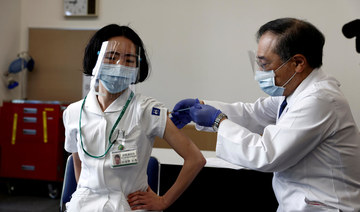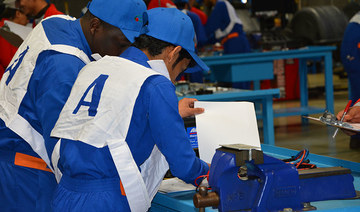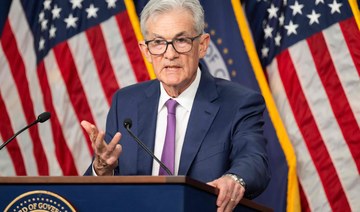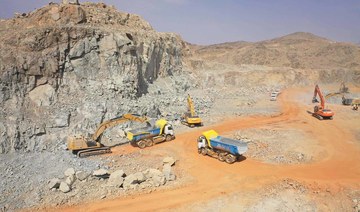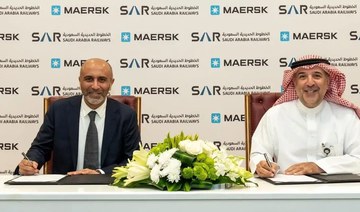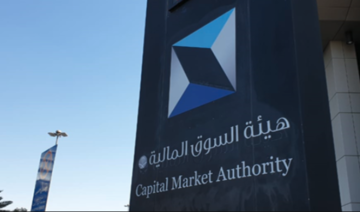TOKYO: Japan’s exports accelerated in January, led by a jump in Chinese demand, and manufacturers’ sentiment turned positive for the first time since 2019 signalling a gradual recovery from last year’s deep coronavirus slump.
Core machinery orders, a volatile but leading indicator of capital spending, unexpectedly rose in December, an encouraging sign for a private sector-led recovery, even as renewed curbs to contain the pandemic weighed on business activity.
Despite the upbeat indicators, however, analysts warn the recovery momentum in the world’s third-largest economy could stall as policymakers struggle to balance the need to contain the virus against the need to revive growth and fix Japan’s dire finances.
“The economy’s recovery is pausing in the current quarter, although development of coronavirus vaccines may reduce risks ahead,” said Hiroshi Miyazaki, senior economist at Mitsubishi UFJ Morgan Stanley Securities.
“Uncertainty remains high for both exports and machinery orders, as delays in vaccinations or resumption of activity among the public on expectations for vaccines could heighten risks of another wave of virus resurgence.”
The indicators followed fourth-quarter gross domestic product data on Monday that showed Japan’s economy grew more than expected, as a fast-recovering Chinese economy helped boost exports and capital expenditure.
Ministry of Finance data showed on Wednesday exports rose 6.4 percent in January from a year earlier, roughly in line with a 6.6 percent increase seen by economists in a Reuters poll and following a 2.0 percent gain in December.
By region, exports to China, Japan’s largest trading partner, jumped 37.5 percent in the year to January, the biggest gain since April 2010, led by chip-making equipment, plastics and nonferrous metal.
The big gain is partly due to the base effect of the large decline seen a year before when the Lunar New Year holidays, which weighs on trade activity, fell in January, a ministry official said.
US-bound shipments fell 4.8 percent, dragged down by airplanes, motors and car parts. Reflecting soft domestic demand, imports fell 9.5 percent in the year to January, versus the median estimate for a 6.0 percent drop, swinging a trade balance to a deficit of 323.9 billion yen ($3.05 billion).
Analysts expect Japan’s economy to contract in the current quarter, as service consumption is hit hard by renewed state of emergency curbs issued last month and set to last until March.
Separate data by the Cabinet Office showed core machinery orders, considered an indicator of capital spending for the next six to nine months, rose 5.2 percent in December from the previous month, versus a 6.2 percent drop expected.
The government described machinery orders as picking up, marking an upgrade for the third straight month from its previous assessment that they were showing signs of a pick-up.
Raising worries about the outlook, however, manufacturers surveyed by the Cabinet Office expected core orders to fall 8.5 percent in January-March, after advancing 16.8 percent in the previous quarter.
Japanese manufacturers’ morale turned positive for the first time since July 2019 in February, the Reuters Tankan survey showed.
Japan’s exports, machine orders pick up as global demand recovers
https://arab.news/g5ujy
Japan’s exports, machine orders pick up as global demand recovers
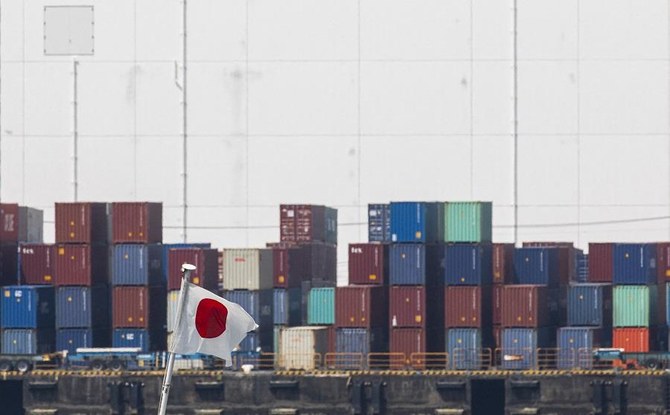
- Core machinery orders, a volatile but leading indicator of capital spending, unexpectedly rose in December
- Despite the upbeat indicators, however, analysts warn the recovery momentum in the world’s third-largest economy could stall
GCC central banks hold interest rates steady for 6th time following Fed’s move
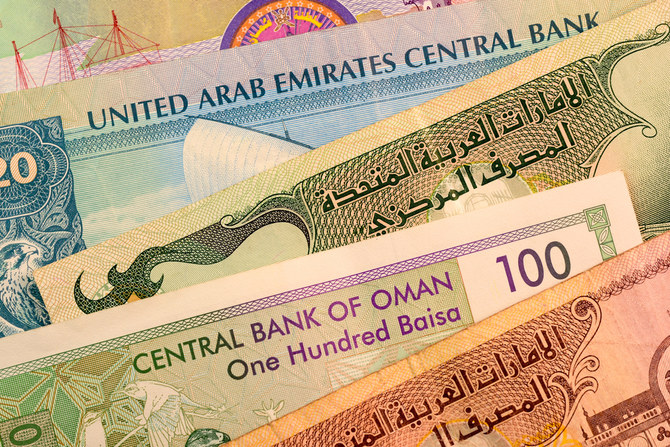
RIYADH: Gulf Cooperation Council central banks have held interest rates steady for the sixth time as the US Federal Reserve keeps its benchmark level between 5.25 percent and 5.50 percent.
As most currencies in the region are pegged to the US dollar, monetary policy follows the decisions taken in Washington, with policymakers opting to lock the rate at the level it has been since July.
The freeze comes as the rate-setting panel cites “a lack of further progress toward the committee’s 2 percent inflation objective.”
Vijay Valecha, chief investment officer at Century Financial, told Arab News: “This decision marks the sixth consecutive time that the central bank has chosen to keep rates unchanged. Market expectations have adjusted, now forecasting only one rate cut by year-end compared to the six anticipated at the beginning of 2024.”
He added: “The monetary policies of most central banks in the GCC countries, including the UAE, Saudi Arabia, Bahrain, Oman, and Qatar, typically mirror those of the Fed due to their currencies being pegged to the US dollar. Kuwait is the exception in the bloc, as its dinar is linked to a basket of currencies.”
Valecha continued by stating that as a result, interest rates in GCC markets are also anticipated to remain stable in the near future, which bodes well for the profitability of GCC banks.
This decision implies that the Saudi Central Bank, also known as SAMA, will maintain its repo rates at the current level of 6 percent.
The UAE central bank, along with Kuwait, Qatar, Oman, and Bahrain, also mirrored the Fed’s move.
Repo rates, which represent a form of short-term borrowing primarily involving government securities, underscore the close economic ties and financial dynamics between the GCC countries and the global economic landscape, particularly the US.
The US central bank also stated that it “does not expect it will be appropriate to reduce the target range until it has gained greater confidence that inflation is moving sustainably toward 2 percent.”
This indicates that rate cuts are not on the cards anytime soon, until inflation cools down and moves sustainably toward the 2 percent target set by the US Fed.
US car marker Lucid partners with KACST to advance EV technology in Saudi Arabia

RIYADH: US electric vehicle manufacturer Lucid Group and Saudi Arabia’s King Abdulaziz City for Science and Technology have inked a pact to boost EV technology development within the Kingdom.
As part of the deal, the California-based firm, in which Saudi Arabia’s Public Investment Fund holds a significant stake, will collaborate with KACST on joint research, utilizing the institute’s services, facilities, and products for dedicated research into advanced battery technologies and materials.
Additionally, they will conduct studies in aerodynamics, autonomous driving, and artificial intelligence technologies, according to a press release.
Faisal Sultan, vice president and managing director of Middle East, Lucid Group said: “Lucid’s goal is to inspire the adoption of sustainable energy by creating advanced technologies. This Memorandum of Understanding marks a key step towards achieving this vision, acting as a catalyst to advance and elevate the entire EV industry and inspire the adoption of sustainable transportation in support of the Kingdom’s vision for a more sustainable and diversified economy.”
The partnership between Lucid and KACST will also include research on electric vehicles, assessing their performance to ensure they are suitable for the climatic conditions in the Kingdom, the release added.
The joint research and development headquarters will be established at the national laboratories in KACST and are scheduled to launch during the third quarter of 2024.
“Using our state-of-the-art facilities, the research conducted under this project will advance electric vehicle systems and aid the development of technologies to support autonomous driving, in line with national aspirations for research, development and innovation in the energy and industry sector,” said Talal bin Ahmed Al-Sudairi, senior vice president of KACST for research and development sector.
The deal will see Lucid Group and KACST collaborating to leverage their expertise in scientific and technical research. Their joint efforts will focus on developing research programs geared toward creating technical solutions for the transportation and energy sectors, thereby bolstering the national economy.
In September 2023, Lucid opened its first plant outside the US in Saudi Arabia with an initial capacity to produce 5,000 EVs a year.
This came as the Kingdom’s government pledged to buy up to 100,000 vehicles from the company over 10 years.
Saudi Arabia open to financing up to 75% of certain industrial projects, says minister

RIYADH: Saudi Arabia is open to providing up to 75 percent of financing for certain industrial projects, a minister has revealed in a bid to incentivize foreign investment and private sector players.
During his discussion with several Qatari investors on the sidelines of the 52nd meeting of the Gulf Cooperation Council Industrial Cooperation Committee in Doha, Bandar Alkhorayef, the Kingdom’s minister of industry and mineral resources, highlighted the vast opportunities that Saudi Arabia’s untapped mining potential provides to global investors.
According to a release on X, he reaffirmed that in addition to the incentives provided by the industrial and mineral wealth system and the multiple sources of financing, the prepared infrastructure in more than 36 industrial cities around the Kingdom offers a sum of qualitative capabilities such as the production of prefabricated factories and long-term rentals.
Alkhorayef further lauded the private sector as the real engine for the Kingdom’s industrial development, noting that the National Strategy for Industry was initially built in partnership with the private sector.
This stems from the nation’s belief in the importance of private sector players and their ability to create promising opportunities in various fields, the release added.
In another boost to the industrial sector in the GCC, the minister headed the Kingdom’s delegation to the industrial committee meetings in Doha. The panel discussed a number of initiatives proposed by Saudi Arabia, including the Gulf Industrial Excellence Award.
In addition, the meeting reviewed the Arab industrial integration strategy and attempts to unify the support provided to the industrial sector in GCC countries, aiming to achieve economic growth and overcome challenges and obstacles faced in the industry.
Furthermore, developments in finding a unified definition for the Gulf national product and its proposed standards were discussed.
The meeting also stressed the importance of supporting the industrial sector in the GCC countries and integrating the roles of respective nations to aid in developing their respective national industries.
SAR sees 9% annual growth in cargo transported
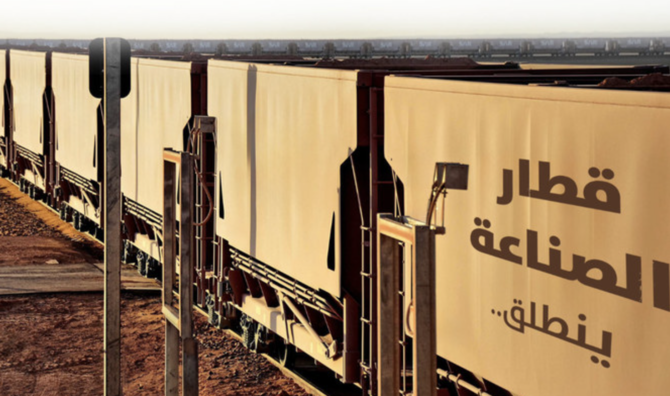
RIYADH: The volume of minerals and goods transported by Saudi Arabia Railways reached 6.34 million tonnes during the first quarter of 2024, an annual increase of 9 percent.
According to its quarterly report, SAR stated that over 2.7 million passengers utilized its services, marking a 23 percent growth compared to same period last year.
Passenger rides also increased by 3 percent, reaching a total of 8,252 trips across the East Train, North Train, and Haramain Express train networks.
Saudi financial sector expands ambitions, eyes foreign investment surge: report
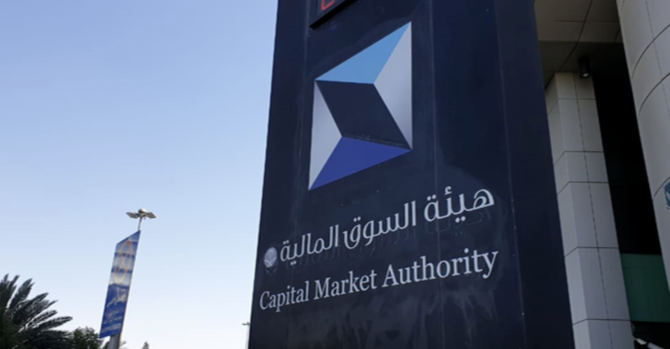
RIYADH: Saudi Arabia aims to enhance its stock exchange appeal to foreign investors, targeting 17 percent ownership of free float shares by 2024, a new report has revealed.
According to the 2023 Financial Sector Development Program document, the Saudi Capital Market Authority plans to boost assets under management to 29.4 percent of gross domestic product by 2024 by increasing the investment environment and attracting more investors.
The report, published annually, highlights the achievements in the financial sector, particularly the Kingdom’s ongoing progress in competitiveness indicators related to the capital market, as stated by Mohammed Al-Jadaan, minister of finance and chairman of the FSDP.
Commenting on the development of the financial sector, Al-Jadaan emphasized the importance of innovation and investment in talent and technology.
“We have placed innovation and investment in both talent and technology at the top of our priorities, because we recognize the importance of building a dynamic financial environment that allows companies — especially startups — to flourish and succeed,” the minister stated.
In line with its commitment to facilitating financing in the capital market, the CMA also plans to accelerate the pace of listings by welcoming 24 new companies in 2024.
Moreover, there will be a focus on supporting the development of new and promising sectors, with a target of having micro and small enterprises account for 45 percent of total listings.
Another area of emphasis is the deepening of the sukuk and debt instruments market, with the goal of increasing the debt-to-GDP ratio to 22.1 percent by the end of 2024. These measures aim to provide diverse financing options for companies and further stimulate economic growth.
“The capital market ecosystem continued its efforts to contribute to developing the financial sector and achieving the Saudi Vision 2030,” stated Mohammed El-Kuwaiz, chairman of the CMA.
“By approving rules for foreign investment in securities and streamlining regulatory procedures, we have witnessed a significant increase in foreign investments in the capital market, reaching SR401 billion ($106.9 billion),” El-Kuwaiz added.
The Saudi Central Bank also reaffirmed its commitment to adhering to international standards and best practices to enhance the strength and stability of the financial sector.
Initiatives such as developing digital solutions for supervising the financial sector and enabling local and international FinTechs demonstrate the Kingdom’s dedication to embracing technological advancements.
Furthermore, the Financial Academy unveiled its new strategy for 2024-2026, focusing on enhancing human capabilities in the financial sector through training programs and professional certifications.
The academy aims to increase the number of trainees and improve the quality of its services to meet the evolving needs of the industry.
The 2023 FSDP report highlighted significant progress across sectors like fintech and digital banking.
The Kingdom saw a surge in fintech companies, surpassing 2023 targets with 216 in operation and launching two digital banks.
Saudi Arabia claimed the top spot in the Corporate Boards Index among G20 nations and secured second place in various indices. Foreign companies relocated headquarters to the Kingdom, deepening the capital market.
Moody’s, Fitch, and S&P Global Ratings revised Saudi Arabia’s outlook to “Positive” and affirmed its “A1” and “A+” credit ratings, citing fiscal policy development, economic reforms, and structural improvements.
Saudi Arabia led venture investments in the Middle East & North Africa, securing 52 percent of total investments in 2023, and allocated SR10 billion to support small and medium enterprises across economic activities and regions in the first half of the year.



